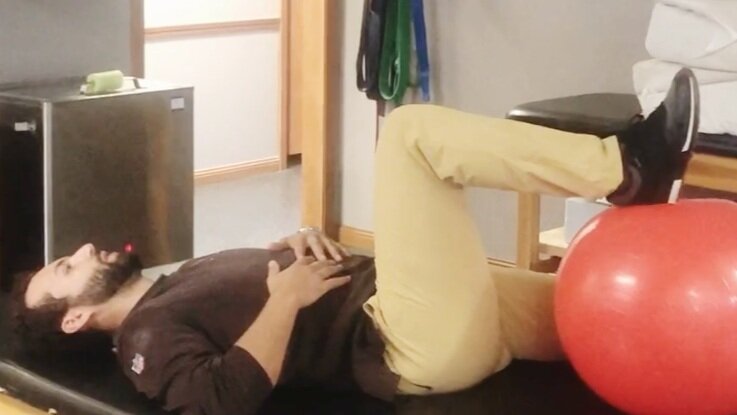Mangiarelli Rehabilitation Physical Therapy Blog
3 Exercises to Address Piriformis Syndrome
Mangiarelli Rehabilitation physical therapist Sarah demonstrates three exercises to address piriformis syndrome. Piriformis syndrome is a condition that develops due to tightening of the piriformis muscle, which can irritate and compress the sciatic nerve and lead to significant pain in the buttocks, hip, lower back, and back of the leg. The piriformis muscle is a small muscle located in the gluteal region under which the sciatic nerve passes that stabilizes the hip and enables lower extremity movement. Physical therapists can relieve piriformis syndrome pain and restore normal movement and range of motion in the affected area through targeted strengthening exercises, manual therapy, and neural mobilization.
May 2023 Newsletter
Check out our May 2023 Newsletter, highlighting punching out Parkinson's with therapeutic boxing, spring donation drive thank you, physical therapy for sciatica, and three exercises for plantar fasciitis.
Physical Therapy for Sciatica
Sciatica is nerve pain that radiates from the low back through the buttocks and down the length of the leg due to compression of the sciatic nerve. Originating in the low back, the sciatic nerve is most commonly compressed by a herniated or slipped disc, causing shooting pain and tingling and numbness through the back and leg. Physical therapy is one of the most effective treatments for sciatica, reducing inflammation, managing and minimizing pain, improving your physical function and mobility, and preventing the reoccurrence of sciatica symptoms.
Physical Therapy for Piriformis Syndrome Infographic
Check out our infographic on physical therapy for piriformis syndrome! Piriformis syndrome develops due to tightening of the piriformis muscle, which can irritate and compress the sciatic nerve and cause pain through the buttocks, low back, and back of the leg. Physical therapy can isolate the true origin of the piriformis syndrome pain, help relieve pain, and restore normal movement and range of motion in the affected area through stretching, manual therapy, and targeted strengthening.
February 2022 Newsletter
Our February Newsletter covers the latest news from Mangiarelli Rehabilitation including how physical therapy can help you recover from Covid, an update on our recently renovated warm water therapy pool, how dry needling works as a physical therapy treatment, and how physical therapy can help you manage sciatica.
Physical Therapy for Sciatica Pain [Infographic]
Check out our infographic on physical therapy for sciatica pain! Physical therapy is the most effective treatment for sciatica pain. Sciatica is nerve pain that originates in the low back and radiates down the length of the leg due to irritation or compression of the sciatic nerve. Physical therapists treat sciatica pain through targeted strengthening of the low back, hips, and gluteal muscles, a progressive exercise program, manual therapy, and aquatic therapy.
Physical Therapy for Piriformis Syndrome
Piriformis pain syndrome can develop due to tightening of the piriformis muscle, which can irritate or compress your sciatic nerve causing significant pain in the buttocks, hip, lower back, and back of the leg. The piriformis muscle is a flat, band-like muscle located in the buttocks directly above the sciatic nerve that stabilizes the hip joint and enables lower extremity movement. Physical therapists can relieve piriformis syndrome pain and restore normal movement and range of motion in the affected area through targeted strengthening exercises, manual therapy, and movement reeducation.
Pulled Muscle vs. Pinched Nerve [Infographic]
How do you know whether you’re suffering from a pulled muscle or a pinched nerve? Both a pulled muscle or a pinched nerve may cause severe pain and limit your mobility, function, and ability to complete daily tasks. Being able to ascertain the difference between a pinched nerve and a pulled muscle is critical to ensure you receive the correct treatment and return to your activities quickly and safely.
Restoring Spinal Health with Physical Therapy
Your spine supports your body in all your daily activities and movements with nearly every movement originating from the spine. It’s critical to care for and strengthen the upper and lower spine for optimal function and to prevent injury. Back and neck pain are among the most common musculoskeletal spine-related injuries. Physical therapy can treat spine-related issues and restore strength and stability in the spine safely and effectively.
September 2020 Newsletter
Check out the September 2020 Newsletter which covers physical therapy as a new approach to pain, sciatica pain relief, back to school ergonomic tips, and a sneak peek of our recently renovated clinic.
Physical Therapy for Sciatica Pain Relief
Sciatica pain is nerve pain that radiates from the low back through the length of the leg due to compression of the sciatic nerve. Physical therapy is the first line of treatment for sciatica pain management, relief, and treatment. Learn what sciatica pain is, how physical therapy treats it, and watch a video by Mangiarelli Rehabilitation therapist Mike for exercises to relieve sciatica pain.





![Physical Therapy for Sciatica Pain [Infographic]](https://images.squarespace-cdn.com/content/v1/5e419cdc97af032560004b99/1642433186988-YGFA0QQANLFLM1BD3D0Y/Blog+PT+Sciatica+.png)

![Pulled Muscle vs. Pinched Nerve [Infographic]](https://images.squarespace-cdn.com/content/v1/5e419cdc97af032560004b99/1611066175350-N1AZ3VBB7OAOTIQ8UNXM/1.jpg)














